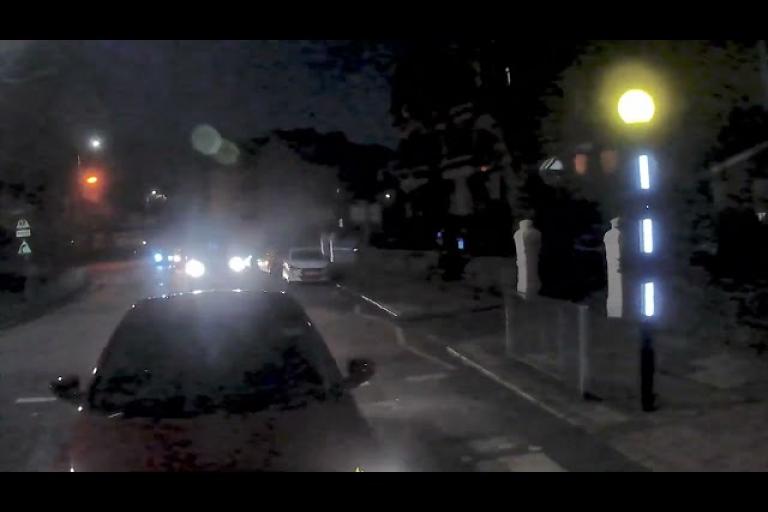- News
- Reviews
- Bikes
- Accessories
- Accessories - misc
- Computer mounts
- Bags
- Bar ends
- Bike bags & cases
- Bottle cages
- Bottles
- Cameras
- Car racks
- Child seats
- Computers
- Glasses
- GPS units
- Helmets
- Lights - front
- Lights - rear
- Lights - sets
- Locks
- Mirrors
- Mudguards
- Racks
- Pumps & CO2 inflators
- Puncture kits
- Reflectives
- Smart watches
- Stands and racks
- Trailers
- Clothing
- Components
- Bar tape & grips
- Bottom brackets
- Brake & gear cables
- Brake & STI levers
- Brake pads & spares
- Brakes
- Cassettes & freewheels
- Chains
- Chainsets & chainrings
- Derailleurs - front
- Derailleurs - rear
- Forks
- Gear levers & shifters
- Groupsets
- Handlebars & extensions
- Headsets
- Hubs
- Inner tubes
- Pedals
- Quick releases & skewers
- Saddles
- Seatposts
- Stems
- Wheels
- Tyres
- Health, fitness and nutrition
- Tools and workshop
- Miscellaneous
- Tubeless valves
- Buyers Guides
- Features
- Forum
- Recommends
- Podcast
news
“That has to be a record”: Cyclist counts 20 vehicles parked in short cycle lane stretch – as council finally considers installing wands; Leeds’ new AI traffic lights “turn green for cyclists”; “Department for Cars strikes again” + more on the live blog
SUMMARY
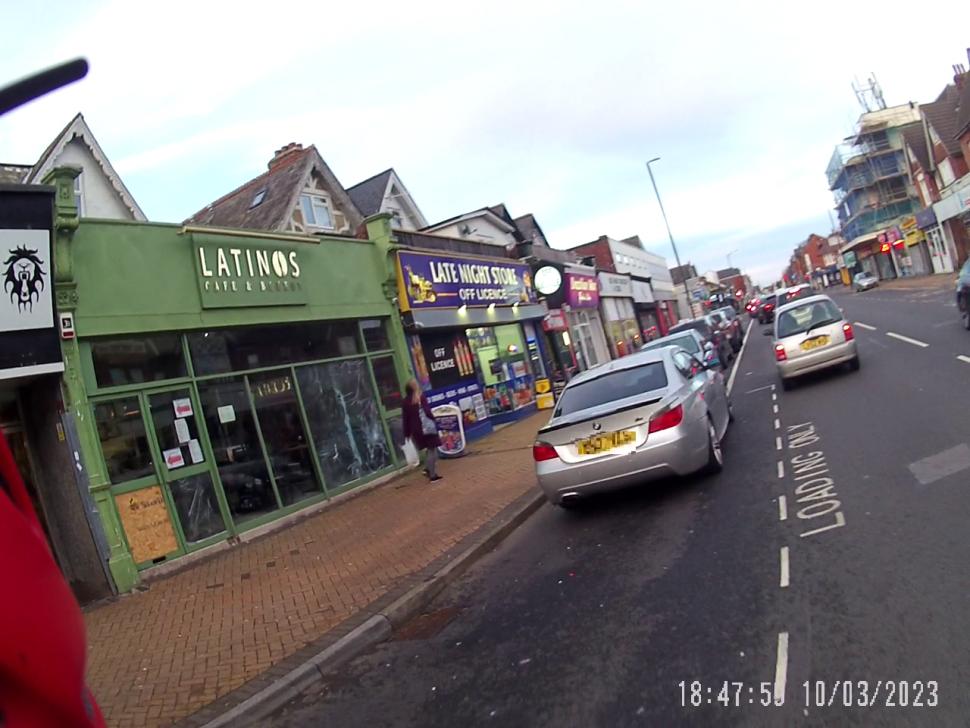 Boscombe cycle lane parkers (credit - Guy)
Boscombe cycle lane parkers (credit - Guy)28 March 2023, 08:17
“That has to be a record”: Cyclist counts 20 vehicles parked in short cycle lane stretch – as council finally considers installing wands
It’s been a month or two since our last visit to Boscombe – you know, the Bournemouth suburb the Daily Mail anguished about last year, the one with “no room left for cars”, yep, that one – and, you’ll be surprised to learn, dear reader, that the issue of illegal parking on the infamous Christchurch Road cycle lane has not relented in the slightest.
In case you haven’t been keeping up to speed with the latest parking developments on the south coast, here’s a brief recap…
Bournemouth, Christchurch, and Poole (BCP) Council’s fairly innocuous decision last year to paint bicycle symbols on the area’s roads – to encourage cyclists to take a “prominent” position – caused something of a meltdown in the national press, prompting the Mail and Daily Telegraph to claim that cyclists in Boscombe were being encouraged to “ignore” the town’s dedicated bike lane and “act like they own the road”.
In a shocking turn of events, that “dedicated cycle lane” eulogised by those papers, it turned out, is almost constantly inundated with parked cars.
Over the last few months, cyclists have regularly posted images of the blocked bike lane on social media, while councillors have called for “zero tolerance” towards the illegal parkers, noting that the “ongoing abuse” of the infrastructure has been the subject of “consistent complaints” from residents.
road.cc reader Guy got in touch this week to confirm that the calls for a clampdown have yet to take hold.
“I cycled the short stretch through Boscombe and counted 20 vehicles illegally parked on a single journey, which has to be a record,” Guy, who sent us a series of photos of the bike lane blockers, told us. “Some of these vehicles are repeat offenders.”
Ah, there’s a nice stretch of clear cycle lane… Oh, wait
But while the problem shows no signs of abating, there is a glimmer of hope for Boscombe’s cyclists – coming in the form of a council review.
The Daily Echo reports that a review on the viability of installing wands on the cycle lane is expected to be completed in the new few weeks.
Earlier this month, councillors Andy Jones and George Farquhar met with the authority’s transport portfolio holder Mike Greene in Boscombe so he could witness the problem “first hand”.
But after a few weeks of silence, Independent councillor Jones gave Greene a slight nudge at a council meeting last week, asking him whether the wands would be installed and, if so, when, given the “ongoing frustration with the volume of illegal parking in this area”.
Greene replied: “Following the site meeting, which only took place a couple of weeks ago, I asked officers to investigate the practicalities and costs of segregating the mandatory part of the Christchurch Road cycle lane with wands.
“That review is currently taking place and the results, which I expect will come over the next few weeks, will be shared with ward members so they can feed into what action might be taken.”
So, maybe, maybe, Boscombe’s cyclists will get some lightly segregated infra, soon… or not so soon. I don’t know…
28 March 2023, 15:58
Christchurch Road? Hulme High Street in Manchester would like a word…
A few readers in the Facebook comments reckon their local car park/cycle lane could give Boscombe a run for its money…
“Hulme High Street in Manchester would like a word,” Karl says. “Council doesn't know what they're doing here with a hybrid parking/cycle lane. Pretending it's for cycles just makes it more dangerous.
“There is a council run 'free’(!) multistorey carpark at the end of the street, but you know, that would involve walking.”
Down in the comments, Patrick9-32 offered a simple, elegant solution to the Christchurch Road bike lane blockers:
£70 fine multiplied by 20 cars. That's £1,400 of revenue the council could make instantly while also making the road safer for both cyclists and drivers. There is no downside for the council other than people who do crimes being annoyed that there are consequences for their crimes.
Though cyclisto came up with a rather more forceful alternative – “a brave man and a red study bicycle”:
28 March 2023, 16:19
28 March 2023, 09:54
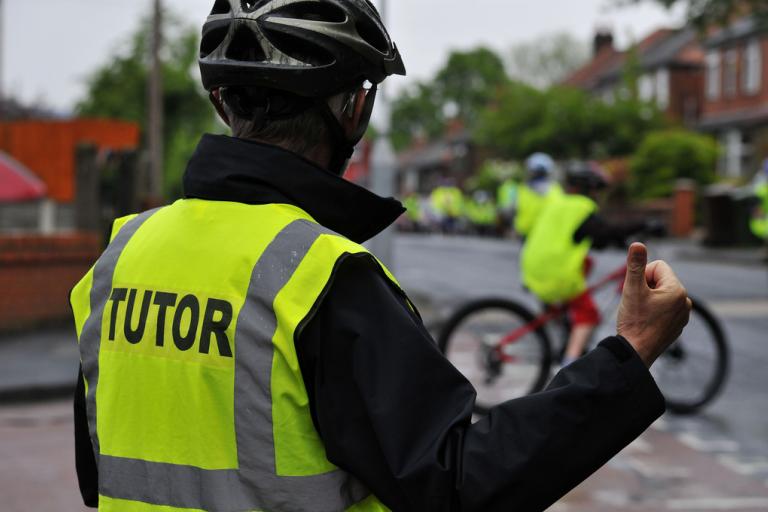
“The Department for Cars strikes again”: Funding for school cycling proficiency scheme axed as Department for Infrastructure says teaching children cycling skills is no longer affordable
In yet another damning indictment of Northern Ireland’s approach to cycling and active travel, the Department for Infrastructure has axed its funding for cycling proficiency lessons in schools, telling the BBC that “budget constraints” mean it can no longer afford to pay teachers and instructors to deliver the scheme.
While the DfI says it will continue to provide training for teachers (who have to register with the department to deliver the scheme), schools will have to pay those teachers during the 12 weeks of lessons, which usually come at the end of the pupils’ final year of primary school.
The cycling proficiency scheme – known as Bikeability in the rest of the UK – has taught more than half a million children how to ride and look after their bike, as well as the rules of the road, for over 50 years.
In 2021/22, more than 300 primary schools took part in the scheme, with the department providing £32,000 in payments to teachers. So far, around £42,000 has been spent during the 2022/23 school year.
However, schools who were planning on holding the classes after Easter have now been told by the DfI that “there will be no budget available for the payment of instructors for delivering the cycling proficiency scheme”.
A spokesperson for the department told the BBC: “The cycling proficiency scheme is delivered by teaching staff in schools, who receive payment from the department for doing so.
“Due to budget constraints, we are not currently in a position to fund this payment to teachers. We will still provide training for teachers, should that be needed, and any practical resources needed to deliver the scheme, should schools want to continue to provide the scheme.”
Schools have until 21 April to inform the department if they intend to run the cycling proficiency classes before the end of the current school year.
In a year which has seen the Department for Infrastructure blasted for showing “zero ambition” when it comes to active travel, the news has, unsurprisingly, been met with disappointment and anger amongst teachers, politicians, and cyclists.
Kevin Donaghy, principal of St Ronan's Primary School in Newry (and, incidentally, this writer’s vice-principal when he was taking his own cycling proficiency lessons. Northern Ireland is a small place), told the BBC that uptake for the scheme had always been high.
“The kids loved it, they actually got a qualification at the end of it to say they were safe to ride on the road,” he said. “It’s a huge thing in the summer term for Primary Seven and at the minute we don’t know whether or not it’s actually going to go ahead.
“We can’t keep asking teachers to do more and more and more and get paid less and less and less.”
The Department for Cars strikes again. I've worked incredibly hard to push DfI in the right direction on active travel and space for people, but with every success we secure, we see two or three examples like this that set us all back. Time to break it up and start again. https://t.co/6gUmEFqKb2
— Cllr. Séamas de Faoite (@SeamasBelfast) March 28, 2023
Meanwhile, SDLP councillor Séamas de Faoite pulled no punches in his appraisal of what he calls “the Department for Cars”.
“The Department for Cars strikes again,” he tweeted. “I’ve worked incredibly hard to push DfI in the right direction on active travel and space for people, but with every success we secure, we see two or three examples like this that set us all back. Time to break it up and start again.”
“This is very disturbing news,” added Alliance Party rep Luke Patterson. “Stats released last week show only one percent of primary school children, and zero percent of post-primary pupils cycle to school.
“With climate and cost of living crises, cycling is a sustainable, healthy, and more affordable form of transport.”
Someone just needs to tell the Department for Infrastructure, eh?
28 March 2023, 08:59
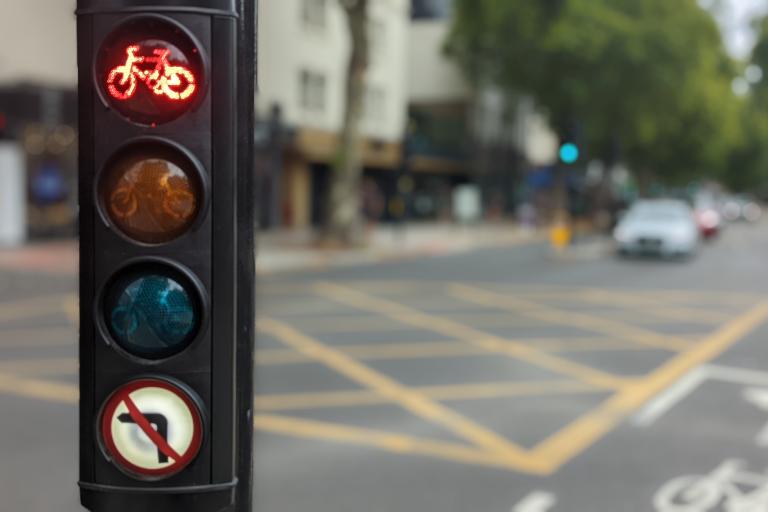
Leeds set to install AI ‘smart’ traffic lights which “turn green for cyclists”
Here’s one for the anti-cycling bingoists…
Leeds City Council has announced plans to install 25 ‘smart signal controls’ – which use artificial intelligence for detecting traffic – across the city in a bid to tackle congestion and improve active travel and public transport journeys.
The ‘AI for Detection’ controls (now that’s a name that’ll surely set some conspiracy theorists off on one) are made by transport technology scaleup VivaCity, and enable junctions to operate more efficiently by responding to real-time demand, Leeds Live reports.
In a similar manner to the “intelligent” traffic lights installed in Copenhagen in 2016, which aimed to ensure that cyclist need never hit a red, the sensors can be optimised for active travel by detecting people on bikes approaching from up to 70 metres away and providing a green light as they arrive at the junction.
> Copenhagen's "intelligent" traffic lights will speed up journeys for cyclists
This kind of technology will also be applied in Leeds to buses, while the sensors will collect data on the different transport types used on the city’s roads, anonymous journey time data, and speed insights (which should enable distinct green phasing waves for different transport types).
This data, Leeds City Council hopes, will also provide the local authority with a deeper understanding of road user behaviour in the city, which should help direct future infrastructure and sustainable transport investment.
> “Game changing” device allows cyclists to control traffic lights so children stay safe
“Our work with VivaCity is making Leeds a safer and more efficient place to travel sustainably. As a city, we’ve experienced increasing problems with congestion and pollution,” says Joel Dodsworth, Urban Traffic Management & Control Manager at Leeds City Council.
“We’re seeing real potential for this technology to improve our bus network because it will enable us to prioritise buses at junctions more effectively at crucial times of the day, while also balancing the needs of pedestrians and cyclists. Overall, Smart Signal Control is making travelling around Leeds more efficient and pleasant for our community, and the city less polluted.”
So everyone’s happy… apart from the ‘cyclists jumping red lights’ brigade, of course.
28 March 2023, 15:18

Tom Pidcock set to make classics return at Dwars door Vlaanderen tomorrow
Strade Bianche winner Tom Pidcock will make his return to racing tomorrow at Dwars door Vlaanderen, the final tune-up race on the Flemish bergs before this Sunday’s hotly-anticipated Tour of Flanders.
The 23-year-old has been in sparkling form this spring, winning a stage of the Volta ao Algarve and placing fifth at Omloop Het Nieuwsblad, before soloing to a sensational win over the Tuscan gravel at Strade Bianche earlier this month.
> Tom Pidcock to miss Milan-San Remo after concussion diagnosis
However, a crash on the final day of Tirreno-Adriatico left the former cyclocross world champion with mild concussion, ruling him out of Milan-Sanremo and the opening races of Flanders’ ‘Holy Week’, E3 and Gent-Wevelgem.
#DDV23: The place to be! 🇧🇪👊
Here's how the boys will line up tomorrow in Waregem. pic.twitter.com/sMaVLWnRHQ
— INEOS Grenadiers (@INEOSGrenadiers) March 28, 2023
But the Ineos Grenadiers have this afternoon confirmed that Pidcock will make his return tomorrow at Dwars door Vlaanderen, where he finished third last year behind Mathieu van der Poel and Tiesj Benoot.
The Yorkshireman, who will add some extra firepower to an already strong team which includes the in-form Filippo Ganna and Ben Turner, will be hoping the prescribed period of rest over the last two weeks hasn’t dulled his race-winning legs, as he aims to hit top form once again in time for the Ronde and the rest of the spring classics.
28 March 2023, 14:39
Wait, does that mean Disneyland’s a “woke vanity project”?
If I were trying to convince my fellow residents that a piece of newly-installed cycling infra was a bad idea, I maybe wouldn’t compare it to the ‘happiest place on earth’, for a start…
28 March 2023, 13:48
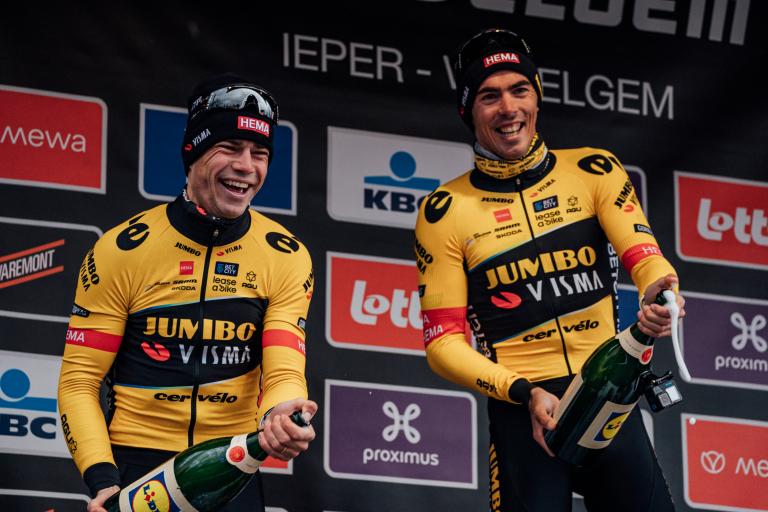
No Gifts: Where do you stand on the whole ‘Wout van Aert as kingmaker at Gent-Wevelgem’ debate?
The 2023 edition of Gent-Wevelgem is already a few days old, but the discursive aftershocks have continued to linger well into Flemish Holy Week.
While it was all a bit too easy for Jumbo-Visma on a grisly days in Flanders’ Fields on Sunday, Wout van Aert’s decision to gift the win to loyal teammate Christophe Laporte has prompted a much stronger level of opposition than the dynamic duo faced on the Kemmelberg.
> Gent-Wevelgem leader takes wrong turn and strays off-course – but holds on to win
On the one hand, former cobbled classics titan Fabian Cancellara praised Van Aert’s generosity, which the retired Swiss rider claimed “elevated” his standing as a true champion. And, as others online pointed out, one victory at Gent-Wevelgem will mean a lot more to Christophe Laporte – who will, we presume, be even more driven to sacrifice himself for his team leader at this week’s Ronde – than a second win in the race would mean to Van Aert’s career.
Christophe Laporte WINS @GentWevelgem ! Amazing gift from Wout van Aert, so generous from him. 👏 #GW23 pic.twitter.com/oeNJIjV933
— Mihai Simion (@faustocoppi60) March 26, 2023
“With that gesture he showed humility, generosity, chivalry... he showed humanity,” Cancellara said in his column for Cyclingnews. “For me, a champion is not only defined by races they win; it’s also the way they win, their personality, the human touches. All these things together add up to make a champion, and if you are willing to raise someone else up, then you are extra special.
“Of course, this was not an entirely selfless deed. I'm not sure winning Gent-Wevelgem changes Wout van Aert’s life. He has won it before, and he won another major Classic just two days ago. What matters most is the Tour of Flanders. That’s the one he wants to win above all else. It’s his one big goal for the entire season – everything else comes afterwards.
“He can afford to give Gent-Wevelgem away as it serves a higher purpose. This was a team victory and it makes the team stronger. He now gets more respect from Christophe Laporte and from his teammates – not to mention the fans.”
wout gift to laporte = people buttmad
wout wins it = people would also be buttmadamazing how champions like wout always get put into this position (he can't do right, always wrong) by people shouting at a screen, eating their 7th donut of the day
— Kjell 🇧🇪 (@FerrexCS) March 26, 2023
Some onlookers, however, such as Belgian cycling luminaries Eddy Merckx and Tom Boonen, were more critical of Van Aert, and argued that a major one-day classic should never be decided on a whim.
“It’s his choice to let a teammate win, but I wouldn’t have done it,” the famously relentless Merckx – who was criticised for not letting a teammate win in a similar manner at the 1969 Liège–Bastogne–Liège – told Sporza after the race.
“Of course I don’t know what’s going on within the team. Wout van Aert was by far the best, you saw that on the Kemmelberg. He could write history by winning [E3] Harelbeke, Wevelgem, and the Tour of Flanders.”
Cheers, Wout (Zac Williams/SWpix.com)
Meanwhile, Boonen dismissed the gesture as a nice PR move by Jumbo-Visma, and expressed his concerns that Van Aert could “regret it” by Sunday afternoon.
“I have also helped teammates to the win, but never in such a situation,” the three-time Tour of Flanders winner said.
“You help teammates to let them fight for the win. This again looked good for the team’s marketing, but I don’t know if I would have done it.
“Jumbo scores, but Gent-Wevelgem is Gent-Wevelgem. That race is a nice addition to your list of honors. It is more than a ride in Paris-Nice. Do you want to win like this? I would have sprinted for it. Such a sprint would have looked strange, but it was the fairest.
“Wout is going to regret it. Riders come and go. Christophe Laporte will probably become the key figure for Wout in Flanders and Roubaix, but that is not a guarantee.
“Suppose you have a hard fall after 5km on Sunday [at Flanders], then you will regret it very much.”
(Zac Williams/SWpix.com)
Cycling writer Herbie Sykes, meanwhile, offered an interesting, and nuanced, take on the subject on Twitter this morning.
Sykes argued that Merckx’s opinion on the matter stems from his own experience as a pro, when – through his ruthless desire to win and prove himself as the strongest rider in the bunch – he single-handedly dragged the sport out of its former corrupt shell, where riders like his former domineering teammate Rik Van Looy could gift, buy, and sell races at their leisure, such was their dictatorial grip on their teammates and the peloton.
Sykes wrote: “You might argue that it was fine for WVA to ‘gift’ the race to Laporte, and that’s fine. Laporte is great, he alone was able to stay on, and he was good enough to do a turn. In isolation it’s cuddly and heart-warming and nice, and of course he’ll work for WVA at the business end.
“However we shouldn’t delude ourselves that he was the deserving rider on Sunday because he wasn’t… The point is that it doesn’t happen in a vacuum, and a cycling paradigm in which races are ‘gifted’, bought, and sold risks becoming institutionally corrupt.”
Worse still, ultimately it leads you right back to 1964, and the original Emperor of Herentals.
Van Looy was a great bike rider, but nobody in their right mind would want that.
ENDS.
— Herbie Sykes (@herbiesykes) March 28, 2023
What do you think? Was Van Aert right to ‘gift’ his teammate the win on Sunday? Or should the strongest, fastest, and smartest rider always triumph at the biggest races?
Or, and I assume this is what you’re thinking, should we just stop talking about this and look forward to Sunday’s Tour of Flanders – where, I’m sure, there won’t be any gifts.
28 March 2023, 13:12
It’s the shifters, Marty, something has gotta be done about the shifters!
28 March 2023, 12:26
Just heading for a bike ride through – checks Garmin – Britain’s biggest sewer
‘Hello, is that Mr Musk? I have an idea you might be interested in…’
28 March 2023, 12:11
28 March 2023, 11:57
Do we really need steering on the turbo?
Like, when you really think about it, is it necessary?
> Five cool things coming soon from Wahoo, Giant, BMC, BTwin, and Bell
28 March 2023, 11:31
Belgian cyclist breaks seven-day distance world record
While the rest of us are slowly building up our mileage as the tantalising prospect of better weather draws ever nearer, for those rare specimens who like to partake in some ultra-distance bike riding, it’s been a busy winter.
Back in November, you may recall, round-the-world cyclist Leigh Timmis broke the world record for the greatest distance cycled unpaced in one week, covering a whopping 2,230 miles in just seven days (a lot more than most of us managed all winter) – with three of those record-breaking days in Florida hit by the small matter of a hurricane.
Well, unfortunately for Timmis, his record – which has previously been held by British cyclist Josh Quigley and Latvian rider Arvis Sprude – has already been broken, this time by Belgian Matthieu Bonne.
The 29-year-old, who took part in Belgium’s version of SAS: Who Dares Wins (I wonder if that’s where Ant Middleton ended up?), travelled to the flat lands of Arizona to take on the record, where he was faced with his own weather dilemma – a stiff breeze.
Nevertheless, Bonne put in 20-hour shifts, averaging around 26 and 27km/h every day, to notch up a staggering 3,619.72km (2,249 miles) during his week in Phoenix, beating Timmis’ record by 19 miles.
And there was me thinking I had a good week…
28 March 2023, 11:13
28 March 2023, 10:42
When you’re so late for work that you can spend over two minutes arguing about LTNs…
It seems that a very logical, rational reaction to a Low Traffic Neighbourhood in Oxford has been doing the rounds on social media this morning:
This 👇👇👇👇👇Oxford? pic.twitter.com/8FGPxuHXsr
— Mark (@markmaycot) March 27, 2023
And you know it’s a big deal when the nation’s beloved custodians of common sense and car-brained patriotism, Darren Grimes and Right Said Fred, weigh in…
Our politicians are enabling these cultists with every damaging policy twist and turn like this. https://t.co/aVZ2NkuOCr
— Darren Grimes (@darrengrimes_) March 28, 2023
@OxfordshireCC stopping people from getting to work. Council representatives get paid to stop other people from getting paid. This is where compliance leads. This bs should be ignored at all costs. https://t.co/begssF86Ol
— Right Said Fred (@TheFreds) March 28, 2023
However, you’ll be pleased to hear that not everyone has reacted to the clip with a ‘country’s gone mad’ style ramble:
Tell me you don't understand the highway code or have any respect for road traffic law without saying it.
Signage is clear.
Personally I would let them drive through and then report each driver to police for the offence. https://t.co/dFRyqRAJHm— Real Gaz on a proper bike: gazza_d [at] toot.bike (@gazza_d) March 28, 2023
Let’s do away with zebra crossings while we’re at it. Why should we stop at the command of those stripy bastards? https://t.co/lbIzwO5f9J
— Rob Burley (@RobBurl) March 28, 2023
You don't see many zebras around these days, anyway. Seems a bit profligate giving them their own bloody crossings. And don't get me started on those entitled pelicans.
— Daniel Olley (@dolleyolley) March 28, 2023
And traffic lights, surely? How do we know who is controlling them. It could be an international socialist conspiracy of ... Conservative County Councils ...
— LDH Marketing (@LDHMarketing) March 28, 2023
Those pesky right lights, zebra crossings, pavements, gates, fields… Why can’t I drive where and how I want? I have to work! And I’ve got kids!
28 March 2023, 09:37
Rat Runs: Before and After
Here's a street in Salford before and after it was closed to rat running traffic pic.twitter.com/ZzOWnMgGjj
— Harry Gray (@HarryHamishGray) March 28, 2023
After obtaining a PhD, lecturing, and hosting a history podcast at Queen’s University Belfast, Ryan joined road.cc in December 2021 and since then has kept the site’s readers and listeners informed and enthralled (well at least occasionally) on news, the live blog, and the road.cc Podcast. After boarding a wrong bus at the world championships and ruining a good pair of jeans at the cyclocross, he now serves as road.cc’s senior news writer. Before his foray into cycling journalism, he wallowed in the equally pitiless world of academia, where he wrote a book about Victorian politics and droned on about cycling and bikes to classes of bored students (while taking every chance he could get to talk about cycling in print or on the radio). He can be found riding his bike very slowly around the narrow, scenic country lanes of Co. Down.
Add new comment
35 comments

Troon
|
1 year ago
4 likes
One for the blog: a great article from a car site: https://jalopnik.com/its-not-the-bike-lanes-fault-youre-a-bad-driver-185...





Daveyraveygravey
|
1 year ago
6 likes

What a short sighted, mean spirited decision. Public bodies are normally very enthusiastic about Bikeability/Cycling Proficiency. It's a cheap and uncontroversial way of saying 'We're doing something for cycling' compared to say hard measures like road re-design.
Hopefully the kids will shame the politicians into a screeching U-turn.

eburtthebike
|
1 year ago
15 likes
Make no mistake, the cuts to funding for training in Northern Ireland and to the Active Travel budget are cold, deliberate political decisions, clearly designed to be divisive. The tories know that they are in for a hammering in the local and general elections, so they are throwing red meat to their supporters, amongst whom are the driving lobby, whilst pretending to make things better for pedestrians, cyclists and the planet.
Without wishing to get so overtly political that I join Martin in being evicted from road.cc, can I urge all of you to vote Green? It seems to be the only way that things are going to change for the better for cyclists, and if enough people do it the major parties will realise that green policies are popular. Full disclosure, I'm standing for the council where I live.

Unfortunately it isn't that simple voting for a particular party member in local politics. In Stapleford for example the green representative didn't support active travel if car driving business owners couldn't park outside their store, and we aren't Holland you know etc. Best to actually find out what each candidate stands for and supports before voting and push them on those promises.

Steve K
|
1 year ago
2 likes
A positive piece in the Times (paywall, sorry) about the anti-aging health benefits of cycling. Though even it can't resist the 'lycra-clad' trope.
A positive piece in the Times (paywall, sorry) about the anti-aging health benefits of cycling. Though even it can't resist the 'lycra-clad' trope.
Here's an un-paywalled version of it: https://archive.ph/vXZud

cyclisto
|
1 year ago
5 likes
All we need to unblock the bicycle lanes is a brave man and a red sturdy bicycle https://www.youtube.com/watch?v=bzE-IMaegzQ

Prosecutions for criminal damage and wasting police time in the UK, I'd suspect. And eventually getting run over by a following bus or beaten by an irate driver.
I thought you meant this man - but I was wrong and it turns out I was just remembering the red panniers on his black Batavus!
Maybe this man and his yellow vehicle is The One?

chrisonabike
|
1 year ago
3 likes
RE: Leeds "smart" traffic lights - this sounds like a good thing for everyone (including those driving ultimately). Hopefully something to celebrate - taking note that what is novel and "smart" here is mundane and standard elsewhere. See for example detail about the traffic light control systems in 's-Hertogenbosch.
Even better if this isn't reinventing the wheel also. Not doing so means having an example of something which could be more effectively re-used - because it's just an adaption of a design which has had far more "development time" and practical testing. Another benefit of using standard systems is that they give you a good baseline to check against when people offer "creative" solutions [1], [2]. Right now the UK doesn't need "smart infra" so much as ... "some infra" - or rather standard, good enough and ubiquitous infra.


Moist von Lipwig
|
1 year ago
6 likes
https://www.theguardian.com/commentisfree/2023/mar/28/prisons-uk-justice...
Hmmm. An opinon piece using that word 'accident' again and not neccesarliy representative of the conclusion on the events of Auriol Grey trial - a link to the judges summing up would probably the first port of call for the invitation for responses.


Jenkins has significant anti-cycling form; most of this article could have come straight from one of our recently-banned little friends:
https://www.standard.co.uk/comment/simon-jenkins-roads-will-be-risky-for...
The acid test for all the defenders of Grey should be one simple question: if a cyclist had pushed a pedestrian off the pavement, or otherwise caused them to fall off it, into the road where they were hit and killed by a car, would that be a tragic accident?
Agreed, it seems very muddled to conflate the overuse of prisons with the jail sentence handed down to a woman who's actions directly lead to the tragic death of another person.
If I wanted to defend Grey I would suggest that she herself, as a vulnerable person, was poisoned by the toxic societal attitudes towards cyclists popularised on SM and ithe MSM. That is the issue that needs to be tackled to avert more tragedies and more prison sentences.
On a broader point this govermnment is now playing to the bigots by criminalising migrants or NOS rather than actually tackling the route causes in an increasingly toxic society. This is a good (non-cycling ralated article) from the Guardian
https://www.theguardian.com/commentisfree/2023/mar/27/laughing-gas-ban-m...

My blood boiled as I read Jenkins conflating the assault and manslaughter of an elderly woman (preceded by a foul mouthed tirade) with illegal felling of trees, theft of penguins and interfering with the boat race. (Nobody drowned.)
In a bizarre twist on 'driverless car' reporting he refers to Grey 'waving' at 'it', the bicycle, referring to the death of the rider as collateral damage arising from a harmless gesture aimed at an inanimate object.
He needs to rewatch the widely posted video of the incident if he thinks Grey was blamelessly waving at a bicycle.

An act of what might be called antisocial behaviour was followed by a terrible accident.
Well, looks like we've figured out Martin's IRL identity.
Going by the sentencing notes posted here a couple of weeks ago, not only does it appear that the judge was satisfied that Mrs Ward was entitled to be on the pavement (so, no - it would not be called "antisocial behaviour"), but he also seemed satisfied that there was a fully intentional "push" aimed at her (so, no - not a terrible accident either).
Jenkins has lost it, his argument is dishonest and he needs to be back in his shed shouting at pigeons.
One telltale is his "being offensive in a Cathedral" involved the offender punching one person, and causing a 70 year old woman to fall breaking her wrist, so "being offensive" was actually Criminal Damage and GBH.

Pages
Latest Comments
- Rendel Harris 2 sec ago
Pissy Sods Pointlessly Objecting
- pmr 15 min 33 sec ago
This is EXACTLY why I will not fund the BBC and urge all others to do the same by boycotting the licence scheme. They are anything but impartial...
- leedorney 31 min 16 sec ago
Instead of the cycle industry crashing, a lot of places have just about kept the head above water, yes the Wiggles have gone etc, but the bike...
- ChrisA 39 min 43 sec ago
No. Effect of vehicle not weight. SUV at 2 tonnes - 2^4 = 16 Bus is 12 tonnes (18t gross) 18^4 = 105,000 About 6500 times
- BadKnee 48 min 14 sec ago
What's a "closed ankle position?"
- Griff500 58 min 27 sec ago
The cease and desist WAS issued to Factor. That's the way they work.
- . . 2 hours 27 sec ago
I have the standard Crane E-Ne (like this without the long stalk) on both of my drop bar bikes, set so I can just reach the trigger with my middle...
- chrisonabike 2 hours 13 min ago
Current Private Eye cover for the win...
- Rendel Harris 2 hours 32 min ago
Just looked up Councillor Chris Williams out of interest and found this in his newsletter for September 2022: "We have had positive feedback from...
- the little onion 2 hours 36 min ago
Winning three world championships is a lot like making love to a beautiful woman....

